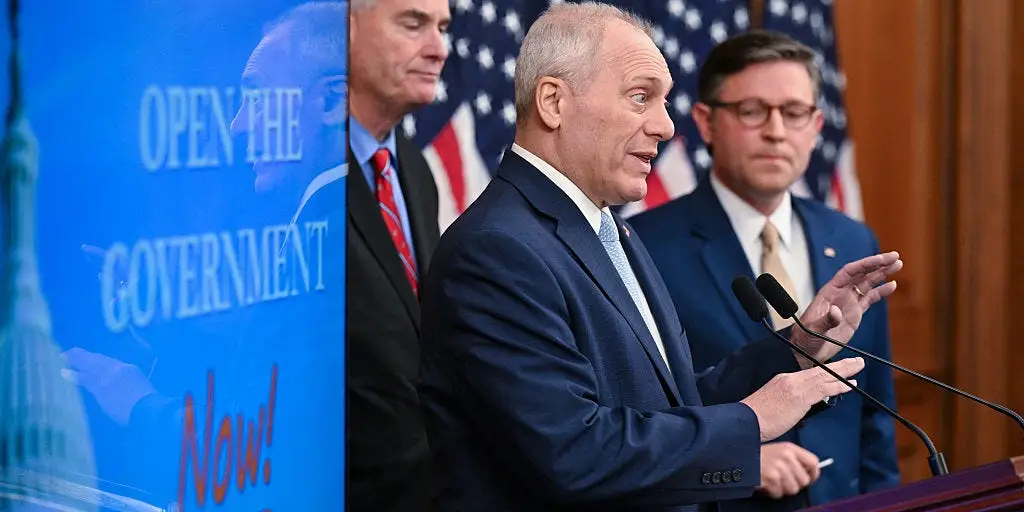Copyright Business Insider

Good morning and welcome to First Trade. The record-breaking rally in gold has been great for investors. Not so much for consumers looking for deals on jewelry. Rundown Palantir posted a record quarter. It bragged about not overhiring and had a lot of thoughts about American culture. The company's high-flying stock fell premarket. Bull market warnings. BCA Research says investors should watch for three signs that the bull market in stocks is in danger. Morgan Stanley thinks it's fine. It highlights two stats from earnings season so far that paint a bullish picture for equities heading into 2026. But first, it's always good to have a fallback plan. Love Business Insider? Log into Googleand make us a preferred source. Was this email forwarded to you? Sign up now Market musings Filling the data void The market has been on such a tear lately that it's been easy to forget the incomplete toolkit investors have been operating with. For every AI mega-deal, there are economic data points being suppressed by the government shutdown. We haven't gotten a jobs report in two months. We've gotten one reading of consumer-price inflation, but it was delayed by weeks, and there's no sign of when the next will come. Over the past couple of weeks, it's been an "out of sight, out of mind" situation for investors. They've elected to focus on the cascade of AI dealmaking, as well as an especially strong earnings season. Record highs abound. But that's put the market in a precarious position. What if, under the surface, things aren't looking so hot? Sure, the increased prospect of near-term rate cuts is bullish for stocks. But that logic can flip on a dime, if investors suddenly decide economic deterioration outweighs the positive impact of rate cuts. For that reason alone, investors should still be keeping an eye on the economy — especially the labor market, which has been highlighted by Fed Chair Jerome Powell as a particular area of weakness. Here are four private economic-data releases investors should be watching this week, in order to paint the most accurate possible picture of health: Tuesday: Investors should watch: The Redbook Retail Sales Index Instead of: Commerce Department retail sales The significance: The health of the consumer is a key input for Fed decision-making when it comes to rate cuts, especially with inflation a lingering worry. Investors should watch: ADP private jobs data Instead of: Monthly nonfarm payrolls The significance: The ADP figures — which are also monthly, though the payroll processor recently launched a new weekly tracker — offer a glimpse into the state of the labor market. Better-than-expected data could throw cold water on the prospect of more rate cuts, which would be stocks-negative. Weak data would have the opposite effect, and potentially lift stocks. Investors should watch: ISM non-manufacturing data Instead of: Bureau of Labor Statistics output productivity The significance: While ISM manufacturing is already the benchmark for this type of data — and monthly, rather than quarterly, like its BLS counterpart — the two are still best viewed in tandem. Lacking one gives a more incomplete picture. Thursday: Investors should watch: Challenger, Gray & Christmas's monthly report of announced job cuts Instead of: JOLTS layoff figures The significance: Better-than-expected Challenger data could throw cold water on the prospect of more rate cuts, which would be stocks-negative. Weak data would have the opposite effect, and potentially lift stocks. Now you have all the tools you need to properly assess the economy this week, as the shutdown threatens to stretch into the longest ever. There's no perfect replacement for government-stamped data, but a combination of the releases above is the next best thing. On the move Last week, I wrote about the kingmaking ability of OpenAI and Nvidia. If they do a deal with a company in the name of AI dominance, its stock is likely to get a nice boost, and the whole market might benefit. Well, apparently I should've included Microsoft in that group, because it sent the Australian AI cloud company IREN Ltd. up as much as 25% after announcing a deal. That, in turn, sent tech stocks as a whole soaring, especially the Magnificent 7. The cohort's immediate move higher is shown in the above chart. BI market mix Morgan Stanley's CIO is bullish after earnings season. Mike Wilson says that positive revenue surprises and EPS growth will continue to lift stocks heading into 2026. BCA Research is back with another warning. The firm has been weighing the impact of continued AI spending. It says a reduction in that — and two other forces — could end up derailing the ongoing bull market in stocks. Beyond Meat tanks. The recent meme-stock darling fell as much as 18% after a material non-cash impairment charge forced the company to delay earnings. It will now report a week later, on Nov. 11. Pro tip Business Insider's Will Edwards highlights investing recommendations pegged to the biggest trends in markets. Healthcare stocks have been among the worst-performing sectors over the last year. But Dominic Pappalardo, the chief multi-asset strategist at Morningstar Wealth, thinks the sector is poised for a turnaround. During a recent conversation we had, he shared a compelling chart showing that the sector has lagged despite soaring earnings growth. "Healthcare has been beaten down for a lot of reasons — mostly earlier in the year related to potential regulatory hurdles and new administration policies affecting healthcare sectors," Pappalardo said. And yet, "healthcare earnings have grown faster than the rest of the US market from mid-2024 to mid-2025." He continued: "You had a situation where the fundamentals were outpacing the broad market, but performance was dramatically lagging. We think that naturally sets up for some reversal to occur." Analysts at Morgan Stanley agree with him. They cited several factors that contribute to their bullish outlook, like impending drug price clarity, insulation from heightened tariffs, a growing number of mergers and acquisitions, cheap valuations, and AI opportunities. Pappalardo threw in another reason: its defensive nature as the job market continues to show signs of weakness. "Even if we get an economic pullback, downturn, or even a recession, healthcare revenues still tend to hold up pretty well," he said. "If you look through the last 12 months of employment reports, 12 out of 12 times, healthcare has been the sector that's added the most employees," he added. "That tells us companies are investing in future growth because they think there's upside down the road, which bodes well for that sector." Build-a-portfolio workshop We're maintaining the First Trade index, an equal-weighted basket of five stocks that will be adjusted each week. After last week's rebalancing, we ended up with this group: Amazon, JPMorgan, Microsoft, Nvidia, and Tesla. Each week, you'll vote one stock out, and one in. Last week we put Nvidia in the index, which proved to be a great move. This week we added Palantir. The AI-driven data software company reported earnings after the closing bell on Monday, which featured record revenue and a sales-guidance increase. Its inclusion will come at the expense of Microsoft, which will be removed. We have essentially swapped one AI play for another. It's a bit of a surprising move — given voting these first few weeks — that we left JPMorgan, which is the only stock whose future isn't heavily pegged to AI. Perhaps it speaks to our desire for stability and consistency that we've left an elite bank untouched. How will it work out for us? Check back next Monday, Nov. 10, for an update. The First Trade team: Joe Ciolli, executive editor and anchor, in Chicago. Akin Oyedele, deputy editor, in New York. William Edwards, senior reporter, in New York. Steve Russolillo, chief news editor, in New York. Huileng Tan, senior reporter, in Singapore.



